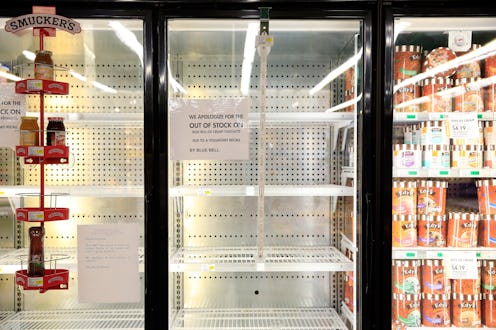News
The Foods Most Likely To Give You Listeria
Last week, ice cream companies Blue Bell and Jeni's both issued recalls after discovering listeria bacteria in its manufacturing plants. Both companies have pulled all of their products off of store shelves and launched individual investigations into the source of the contamination. While the FDA does not believe the two cases are linked, what they do have in common is, well, ice cream. But besides the frozen treat, there are certain foods most likely to be contaminated with listeria, and many of them are things we eat every day.
After issuing their voluntary recalls, both Blue Bell and Jeni's are closing their production facilities until their respective investigations are complete and their products are guaranteed to be listeria-free. Last Friday, FDA spokesman Jeff Ventura issued a statement addressing whether the two recalls were related.
At this time, the FDA does not believe that the finding of listeria in one sample of Jeni's Splendid Ice Creams is related to the outbreak and recall associated with Blue Bell Ice Cream. We are continuing to investigate both situations and will provide updated information to consumers as we learn more.
It's not far-fetched that the similarities in the two cases are purely coincidental. According to Foodsafety.gov, unpasteurized (raw) milk and dairy products are one of the most common sources of the listeria bacteria — unpasteurized milk is the raw material for ice cream. It's possible that the listeria grew in the plants before the milk was pasteurized, a heating process that kills harmful bacteria.
The website also notes that, unlike other contaminants, listeria can thrive in cold temperatures, which would explain how it survived in the ice cream plants. And like other bacteria, listeria can be potentially deadly. Besides symptoms including vomiting, fever, diarrhea, and weakness, listeria kills one in five people infected, according to a recent Food Safety News report.
Besides unpasteurized milk, here are five foods that are most likely to be contaminated by listeria.
Processed Deli Meats
Preserved meats like sliced turkey, hot dogs, and even packaged pâté can be the source of listeria, because they are eaten raw. Heating these products at high heat would kill the bacteria — but with the exception of hot dogs, when would you ever eat these hot?
Preserved And Raw Seafood
Of all the types of food that the FDA tested for listeria, according to Forbes, smoked seafood tested positive the most. A substantial 12.9 percent of the 7,855 samples tested came back positive for listeria. Canned and raw seafood also tested relatively high.
Fruit
Fruits can often be contaminated by listeria, but it's worth noting that the bacteria only affects the outside skin, not the actual flesh. In order to avoid being infected, wash your fruits rigorously, peel the skin, and then wash again before consuming. Be sure to wash your hands, too.
Soft Cheeses
Cheese varietals like feta, brie, camembert, and blue cheese tested high for listeria. Try to avoid the unpasteurized versions of these, and if you can, eat cheese cooked (though I know that's a tall order).
Root Vegetables
Vegetables that grow in the ground, like potatoes, beets, and carrots, can be contaminated by listeria in the soil. While it's not recommended to avoid these vegetables altogether, you can decrease your chances of getting ill by thoroughly washing them before handling and, of course, cooking them.
Images: Getty Images (6)
